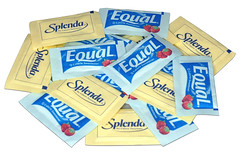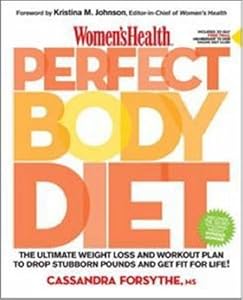
Not many people know this about me, but I'm totally an environmentalist. I posted a bit about my recycling/green passion
here back in January. I'm so concerned about what's going to happen to our planet that I'm almost considering switching careers and becoming and environmental scientist. But... after 12 years of nutrition, I think I'll just combine the two.
For example, to show my concern, my father-in-law recently moved out of his home after 30 years (my mother-in-law passed away 7 years ago), and as you can imagine, he threw away a lot of "junk". However, I wasn't going to let him just toss everything. Instead, I went through every garbage can and separated the papers from the plastics from the metal from the electronics. I took all the recyclables to the local recycling center, found a special electronics recycling station for all the old computer parts and accessories, and took anything re-usable to the Salvation Army.
Also, in my own home, I've reduced our trash so much through recycling and composting that we only have to take the trash "out" every 2 to 3 weeks (Our recycling bin though is packed!)
So when one of my friends, Summer, passed along this great story about Wal-Mart pushing the green movement, I was ecstatic! And what better company than this to do so considering that many people who have little to no clue about their carbon footprint/environmental impact shop there and waste more than necessary?
I'm glad to see Wal-Mart doing this - it'll only help our planet instead of continually harming it.
Read the article below. You can find it all over the internet to read about it more. Enjoy!

Wal-Mart To Become Green Umpire
Mon Jul 13, 2009 5:49pm EDT
PepsiCo (PEP) buys lots of renewable energy, while a Coca Cola (KO) plant recycles plastic bottles. Should environmentalists drink Pepsi or Coke?
Dell (DELL) is "carbon neutral." Hewlett Packard (HPQ) says it designs for the environment. Whose laptops are more "green"?
So many choices, so little reliable guidance: Clorox GreenWorks or Seventh Generation? Local or organic strawberries? Paper or plastic? Who's to say?
Wal-Mart (WMT), that's who.
The giant retailer ($406 billion in revenues in 2008) is developing an ambitious, comprehensive, and fiendishly complex plan to measure the sustainability of every product it sells. Wal-Mart has been working quietly on what it calls a "sustainability index" for more than a year, and it will take another year or two for labels to appear on products. But the company's grand plan-"audacious beyond words" is how one insider describes it-has the potential to transform retailing by requiring manufacturers of consumer products to dig deep into their supply chains, measure their environmental impact, and compete on those terms for favorable treatment from the world's most powerful retailer.
Wal-Mart intends to announce the sustainability index at a meeting on Thursday, July 16, at its corporate headquarters in Bentonville, Ark., to which hundreds of suppliers, academics, environmentalists, and government officials have been invited. There, the company will unveil a sustainability consortium led by the University of Arkansas and Arizona State University that will provide scientific research to support the effort. Faculty at Duke, Harvard, Stanford, the University of California at Berkeley, and the University of Michigan have been involved in planning the index, but they haven't yet agreed to join the consortium, in part because some college administrators are skittish about working with Wal-Mart. Consumer-goods companies Procter & Gamble (PG), General Mills (GIS), Tyson (TSN), and Unilever (UN), among others, are partners in the consortium. And competing retailers including Costco (COST), Target (TGT), and Kroger (KR) have been invited to join. This is, in other words, a very big deal.
Wal-Mart declined to discuss the index in advance of its meeting. So did other retailers. But details are trickling out.
"Bringing clarity to this question of what is more sustainable is a key role for Wal-Mart," said Rand Waddoups, senior director of business strategy and sustainability at Wal-Mart, when we talked at a Greenbiz.com conference in May.
"Imagine one day when every product on the shelf has behind it enough information from a life-cycle-thinking perspective that allows us to be much, much more intelligent about how we're buying," he went on. "And really, in the end, eventually, what consumers should be."
While Waddoups did not say much more than that, he made clear that one goal of the index will be to help consumers navigate conflicting or misleading claims.
"We understand green-washing. [Our customer] doesn't. She may not even be aware that it's going on," he said.
The initiative raises a thicket of questions, some about the very idea of a sustainability index and others about the nitty-gritty of its execution. To begin with, an obvious question: Who chose Wal-Mart to be America's regulator?
This isn't a facetious question. Wal-Mart has an enormous influence over which products get made, and which don't. Last year, the company said it would stop selling baby bottles containing the chemical bisphenol-A, which is approved by U.S. and European regulators. (A story that I wrote about this for Fortune magazine ran under the headline "Wal-Mart: the New FDA"). When, as part of its ambitious sustainability program, Wal-Mart said it would sell only concentrated laundry detergent, which uses less packaging and water, manufacturers fell into line. The company even makes foreign policy, of sorts, declaring last year that it would stop selling products made with cotton from Uzbekistan, to try to put an end to forced child labor in cotton harvesting.
Wal-Mart doesn't ultimately want to own the sustainability index, which is why it is forming the consortium. "They are willing to get the ball rolling, but they want to hand it off to someone else," an insider says. Most likely, the index will eventually be run by a nonprofit group financed by retailers and suppliers, much like the Marine Stewardship Council, which certifies the sustainability of fisheries, and the Forest Stewardship Council, which does the same for wood products.
Still, measuring the sustainability of a flat-screen TV, a trampoline, a backpack, a baby stroller, or a bag of poultry feed—all of which are sold by Wal-Mart—is a whole lot more complicated than certifying a fishery or forest. Wal-Mart plans to use a tool known as Life Cycle Assessment, which is designed to measure the full environmental impact of a product through manufacture, use, and disposal. It will ask its 60,000 suppliers to help.
"The idea is to be as comprehensive as possible," says Jon Johnson, who holds the Walton professorship in sustainability at the University of Arkansas. "Unless you look at the entire life cycle of the product, you just can't measure the environmental impact." Johnson and Jay Golden, an assistant professor in the school of sustainability at Arizona State, are leading the consortium.
For the index to work, consumer-goods makers will need to understand the origins of everything they put into their products. Wal-Mart has talked about assessing sustainability in four broad categories: energy and greenhouse gas emissions, materials, natural resources, and "people and communities," which will attempt to measure social impacts. Right now, most supply chains are opaque: Try tracing a hamburger to a particular cow.
"Can you have trackable, traceable supply chains that give you full visibility?" asks Andrew Hutson of the Environmental Defense Fund, who works with Wal-Mart. "It is extraordinarily difficult at this moment. But it can be done." We'll soon see if he is right.


![Reblog this post [with Zemanta]](http://img.zemanta.com/reblog_e.png?x-id=c9f4bd48-b94e-4304-a18e-88dcdeb3aea0)



![Reblog this post [with Zemanta]](http://img.zemanta.com/reblog_e.png?x-id=3736bb5a-e451-4fb0-b43e-2fba94c15030)



![Reblog this post [with Zemanta]](http://img.zemanta.com/reblog_e.png?x-id=5b395cd6-400d-4e79-9e14-383b78564bbd)






![Reblog this post [with Zemanta]](http://img.zemanta.com/reblog_e.png?x-id=cf4583e2-e0cf-435d-ab72-a19381abb9cb)

![Reblog this post [with Zemanta]](http://img.zemanta.com/reblog_e.png?x-id=3181fe12-65a9-4b50-986a-acc048a13bd1)


![Reblog this post [with Zemanta]](http://img.zemanta.com/reblog_e.png?x-id=e4bc8996-0126-4acc-8883-0ecca6af358c)

![Reblog this post [with Zemanta]](http://img.zemanta.com/reblog_e.png?x-id=e9e8bfa0-d8f4-4367-9400-bb86a3cd33ab)

ROTATING_4+copy.gif)



